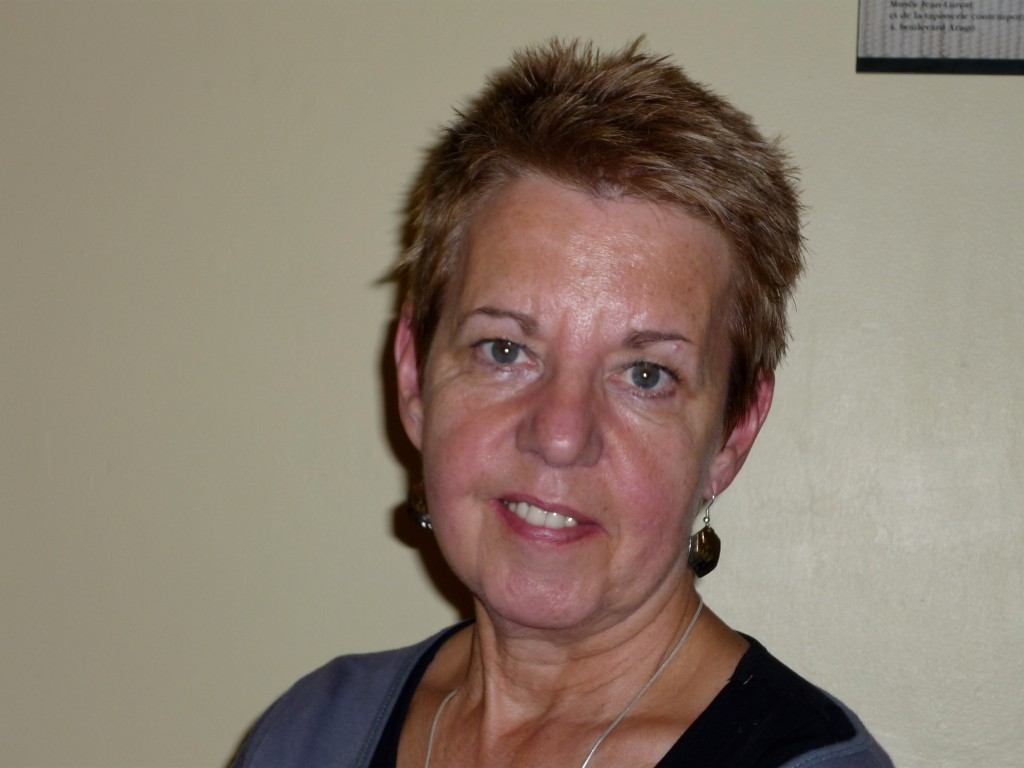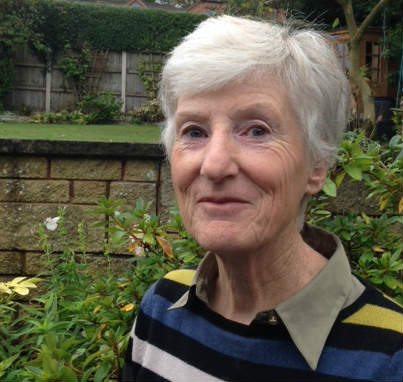
by Joan Rapaport
Last week (6 February) the Social Care Workforce Research Unit hosted its sixth joint annual conference on the theme of older people. It is organised jointly with Age UK London and Making Research Count and, this year, supported by The British Society for Gerontology. The topic: housing and older people. Speakers included Jill Manthorpe, Vic Rayner, Jeremy Porteus, Simon Evans, Maureen Crane, Louise Joly and Maria Brenton. Joan Rapaport reports.
Why the interest in older people’s housing?
Professor Jill Manthorpe (Director, Social Care Workforce Research Unit) highlighted increasing interest in the role of housing and environment on health and wellbeing in later life. She pointed to the sudden (re)discovery of the triangle of health, housing and care contributing to quality later life. Poor housing and environments undermine the potential benefits of social care and technological advances. Depressing environments may foster depression and inaccessible or hazardous environments compound isolation. We have long known that dampness, mould and cold are bad for health; recent research also suggests that loneliness can be as bad as smoking on health. Whilst some commentators accuse older people of stealing the pensions of their younger counterparts and draining health resources, and denying them access to the housing ladder, the idea of a ‘jilted generation’ has scant evidence. If anyone had been jilted it was the generations who were promised ‘homes fit for heroes’ many of whom who spent their old age in cold, disabling and poor housing.
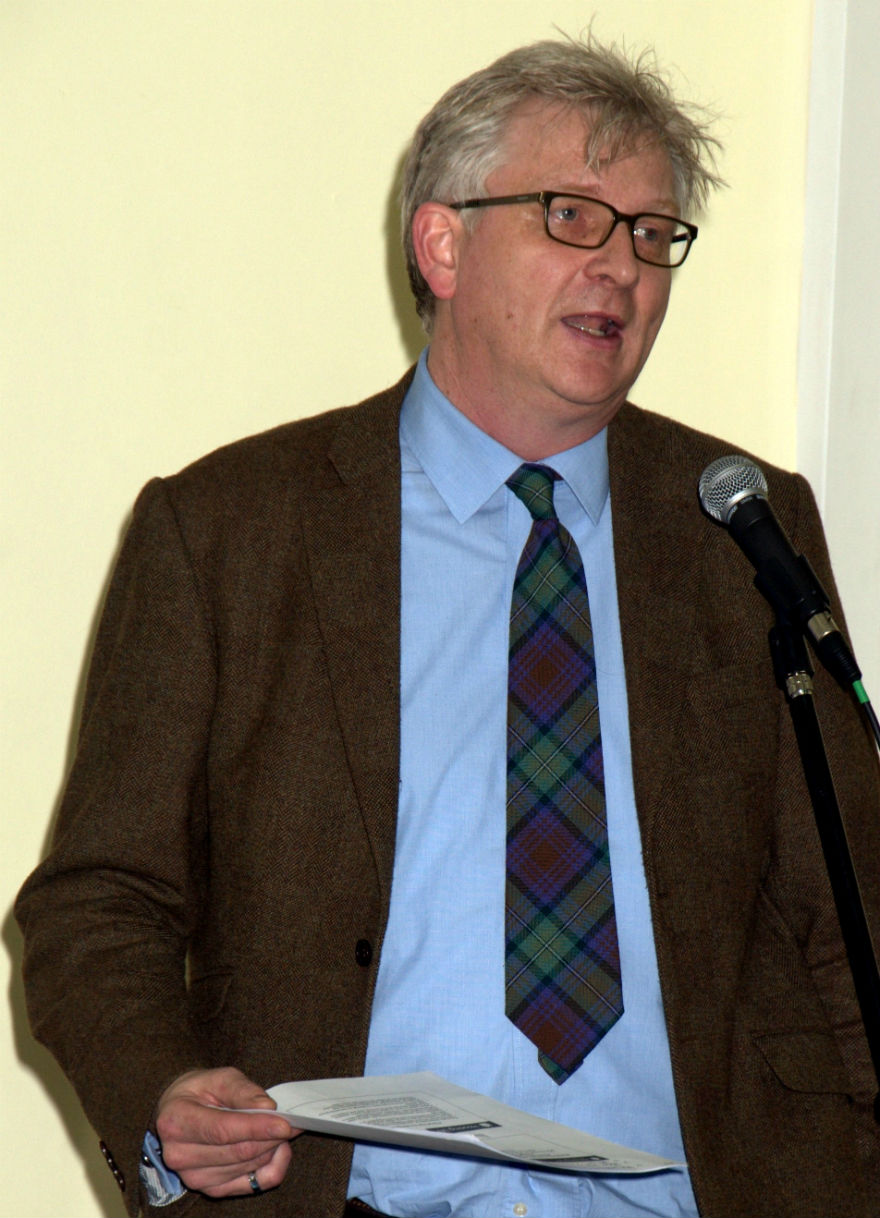
Jeremy Porteus
Drawing on a recent personal experience, Jeremy Porteus (Director, Housing, Learning and Improvement Network (LIN)) highlighted the problems people face when planning for old age. There is no central ‘Ideal Home Exhibition’ point from which to make the perfect choices, there are psychological barriers to facing the future and a decision may have to be made in a crisis. Although the government is greatly concerned about the ageing population, the Select Committee on Public Service and Demographic Change (Lord Filkin, 2013) found that the housing market is delivering much less specialist housing for older people than is required and that national and local government and housing associations urgently need to make plans. Jeremy commented that if we are to build better homes then we also need to shape communities: making this more just a question of supply and demand.
Jeremy described the benefits deriving from purpose built projects and the emerging evidence base for positive outcomes. As just one example, people who were lonely with high needs had moved into Extra Care accommodation that had been funded by the Department of Health (DH). Within six months to a year many had experienced improvements in their wellbeing, ability to self-care and autonomy, creating savings in health and social care budgets. Extra Care projects are provided in a wide variety of ways including community led housing, cooperatives and cohousing as well as sheltered housing, retirement villages, almshouses and homesharing. Jeremy exhorted conference participants to join Housing LIN to keep abreast of strategic developments and opportunities and service innovations. Housing LIN is the leading ‘learning lab’ for a growing integrated network of housing, health and social care professionals in England involved in planning. As such, it is at the forefront of policy, research and practice developments and is a member of the Prime Minister’s The Dementia Challenge health and care champion group.
Vic Rayner (Chief Executive, SITRA) questioned the source of the ‘drain’ perceptions of older people in society. The evidence shows that contrary to these ‘doom and gloom’ predictions, people living longer lives are an asset to their communities and families, many working as volunteers, providing neighbourly support and helping with childcare responsibilities.
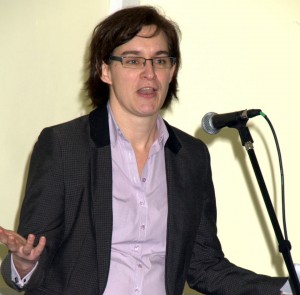
Vic Rayner
And the pictures of older people being drains on taxpayers are exaggerated, she observed. Close analysis of available data illustrates that the average annual unit cost of sheltered accommodation is just £311.10 – an amazing bargain! An investment of £198.20 in sheltered accommodation yields a saving of £646.90; of £32.40 in sheltered accommodation for older people with higher needs, savings of £123.40 and older people receiving floating support £97.3 and £628 respectively. Service user objectives of having access to assistive technology, security of tenure, personal security, greater autonomy and contact with family and friends are largely met. Yet supported provision for older people when compared to other population groups, is meager and may now be additionally under threat from local authority budgetary constraints.
‘On the Pulse’ case studies show how good practices in housing and health delivery can achieve good outcomes in:
- Transferable care packages from housing to hospital and vice versa
- Supporting re-ablement through telecare
- Creating solution orientated partnerships across traditional health, social care and housing sectors
Vic highlighted the importance of commissioners’ valuing what matters to service users and including in their audits ‘soft’ and ‘hard’ outcomes, rather than focusing on a set of outputs defined by funders. She endorsed views that deeply ingrained attitudes towards older people needed to change.
Dr Maureen Crane and Dr Louise Joly (Honorary Senior Research Fellow and Research Fellow respectively at the Social Care Workforce Research Unit) drew on their current research on the housing and support needs of older homeless people.
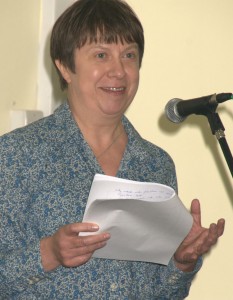
Louise Joly
Emerging findings from this unique study investigating what has happened to homeless people since they were rehoused five years ago demonstrate the potential problems of withdrawing support. Their research suggests that homelessness amongst people aged over 50 years is increasing, although no accurate figures are available. Homelessness in later life happens for a variety of reasons, such as breakdown in long-term marital or partnership relationships, death of a parent or spouse as well as mental health and substance misuse problems. Some people have poor budgetary skills and become evicted from the former family home. Some have literacy difficulties. While homelessness can be short term, so far nearly half of their research sample had been homeless for more than five years before being rehoused.
In this study, participants were first interviewed six months after they had been rehoused. Most, by far, not surprisingly, were glad to have been rehoused, regarded their accommodation as ‘home’, valued their privacy and control, and felt safe and comfortable. However, almost half were in debt. Significantly, those in sheltered accommodation were less likely to be worried or to mention they felt depressed.

Maureen Crane
Five years on about a third were still in their original accommodation. Of the minority who had moved, some had changed to live in more supported accommodation. Of those in their original accommodation, case examples highlighted struggles that had increased once their support workers had been withdrawn. These people were living impoverished, isolated lives. Unrealistically, some with health problems were being required to look for work. Maureen had been unable to interview one individual, in a great state of despair about her finances, until she had helped her to complete an application for welfare benefits. Some of the questions were difficult to understand. The form was 57 pages long and had to be printed: for this the internet café was the only option. The individual, who had relied on friends for money for two months, had to pay £8 from her benefits’ for her application to be printed!
This research is indicating that many older homeless people want permanent accommodation but many require supported or specialist living arrangements. The support needs of homeless people can fluctuate once rehoused and some do not seek help when faced with difficulties. There is currently a lobbying vacuum following the demise of the UK Coalition on Older Homelessness in 2010. Maureen and Louise highlighted the need for a new campaigning group to raise awareness of the particular needs of older homeless people.
Next to present, Dr Simon Evans (Senior Research Fellow, Institute of Health and Society, University of Worcester) asked what Extra Care housing offered older people? Drawing on emerging findings from the ASSET research project (funded by NIHR School for Social Care Research), Simon explained that Extra Care housing covers units for rent, purchase and includes some retirement villages. Extra Care is typically characterized by having facilities that enable social interaction, activities, outside support and the ability to buy in flexible care packages. The model provides many opportunities to meet the diverse needs and circumstances of older people. For example, the characteristics and needs of residents are wide ranging. Schemes may rely on multiple funding sources, multiple partners and multiple commissioning agencies. There is a range of financial and legal considerations such as for rent, or purchase, and charges for service, support and/or care packages. There are many types of building options such as ‘top of the market’ facilities, specific age friendly designed complexes, or converted council tower blocks. The literature on social care and support in housing for older people is meager.
When planning for their ‘ideal home’ consumers may be faced with differing local authority arrangements, the effects of welfare reforms and budgetary constraints, new models of commissioning and different approaches regarding levels of need. Simon explained that agreement on priorities and tendering arrangements with local authorities preoccupy commissioners. Key factors regarding the commissioning of social care in housing include the relationship between the housing and care provider, the building type, layout and location, the facilities on offer, tenure and letting policy and the mix of care needs required by the residents. However, ideas about what facilities are wanted by people with high needs are changing. As one example, meals and restaurants on site are proving popular but they may not meet everyone’s preferences.
Despite these complications, Simon ended by highlighting some of the benefits of extra housing such as:
- Serving as community hubs for services
- Supporting couples to stay together (in contrast to traditional models of residential care)
- Promoting independence
- Potential for saving money when compared with the costs of care homes.
Concluding the day, Maria Brenton (Project Consultant to Older Women’s Cohousing Company) outlined the concept of cohousing: which essentially aims to combine personal autonomy with community in old age. Maria explained that there are a small number of cohousing schemes emerging in England where people are coming together with the intention of living in a community and a commitment to mutual support. They share values and each agrees to share responsibility for the group as a whole. Each ‘cohousee’ has her or his own accommodation and own front door. The model is well established on the continent but is starting to gain some momentum here.
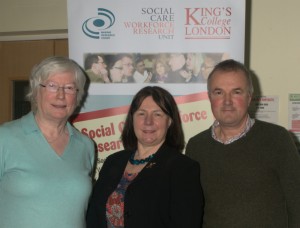
Maria Brenton, Jill Manthorpe and Simon Evans
Maria highlighted the potential strengths of cohousing particularly in respect of combatting loneliness ‘which is probably a killer’. As people come together to design, build, develop and manage the project, they get to know each other well. Cohousing offers the prospect of good social contact, opportunities to share skills and the benefits of old fashioned communities with help at hand right next door.
In the UK 14 schemes are in the pipeline. The scheme she is involved in ‘OWCH’ (Older Women’s Housing Cooperative) is likely to be the first of its kind in the country. However, the model is very new to commissioners and cohousing pioneers face many challenges. A shift in perspectives is required.
For social workers and social care practitioners there were several key messages from the day
- Loneliness is a potential killer – it is important to consider when thinking about outcomes. The contribution of housing and the built environment to contributing to loneliness should be assessed and addressed.
- Attitudes about ageing and older people need to change and social work can play its part in this by working with older people and their organisations.
- Extra Care is often cost effective and outcomes are often good; social workers should be familiar with what is on offer and its opportunities.
- Not providing Extra Care may cost the public purse more so local investment in it could be supported. As well as providing construction jobs, Extra Care offers local work.
- There is wide variety of supported housing schemes and social workers need a local ‘map’ to know what people might consider or should be confident that there are local information and advice agencies that can provide person-centred services.
- The potential of older people to design their own schemes has not been realized; social workers can put people in touch with national bodies.
- The importance of older people engaging in national and local consultations to improve their housing and wellbeing is one that social workers can convey in community development work.
This conference was the 6th annual joint event (CPD certified) held by Making Research Count at the Social Care Workforce Research Unit with Age UK London. This year the conference was supported by the British Society for Gerontology. It was held on 6 February 2014 at Henriette Raphael House, Guy’s Campus, King’s College London.
Dr Joan Rapaport was, until recently, Visiting Research Fellow at the Social Care Workforce Research Unit, King’s College London and is a lay member of the Mental Health Review Tribunal.
Conference photographs: Cliff Chester
For more on the conference (including presentations) go to the Event website.
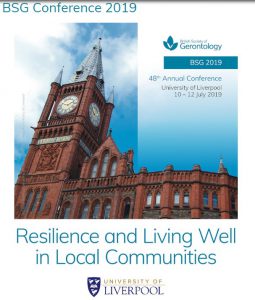 HSCWRU researchers enjoyed two and a half days of stimulating presentations, symposia and keynote speeches at the British Society of Gerontology’s (BSG) 2019 Annual Conference held this year in Liverpool. The 48th BSG annual conference was entitled Resilience and Living Well in Local Communities and took place from 10 to 12th July at the University of Liverpool.
HSCWRU researchers enjoyed two and a half days of stimulating presentations, symposia and keynote speeches at the British Society of Gerontology’s (BSG) 2019 Annual Conference held this year in Liverpool. The 48th BSG annual conference was entitled Resilience and Living Well in Local Communities and took place from 10 to 12th July at the University of Liverpool.
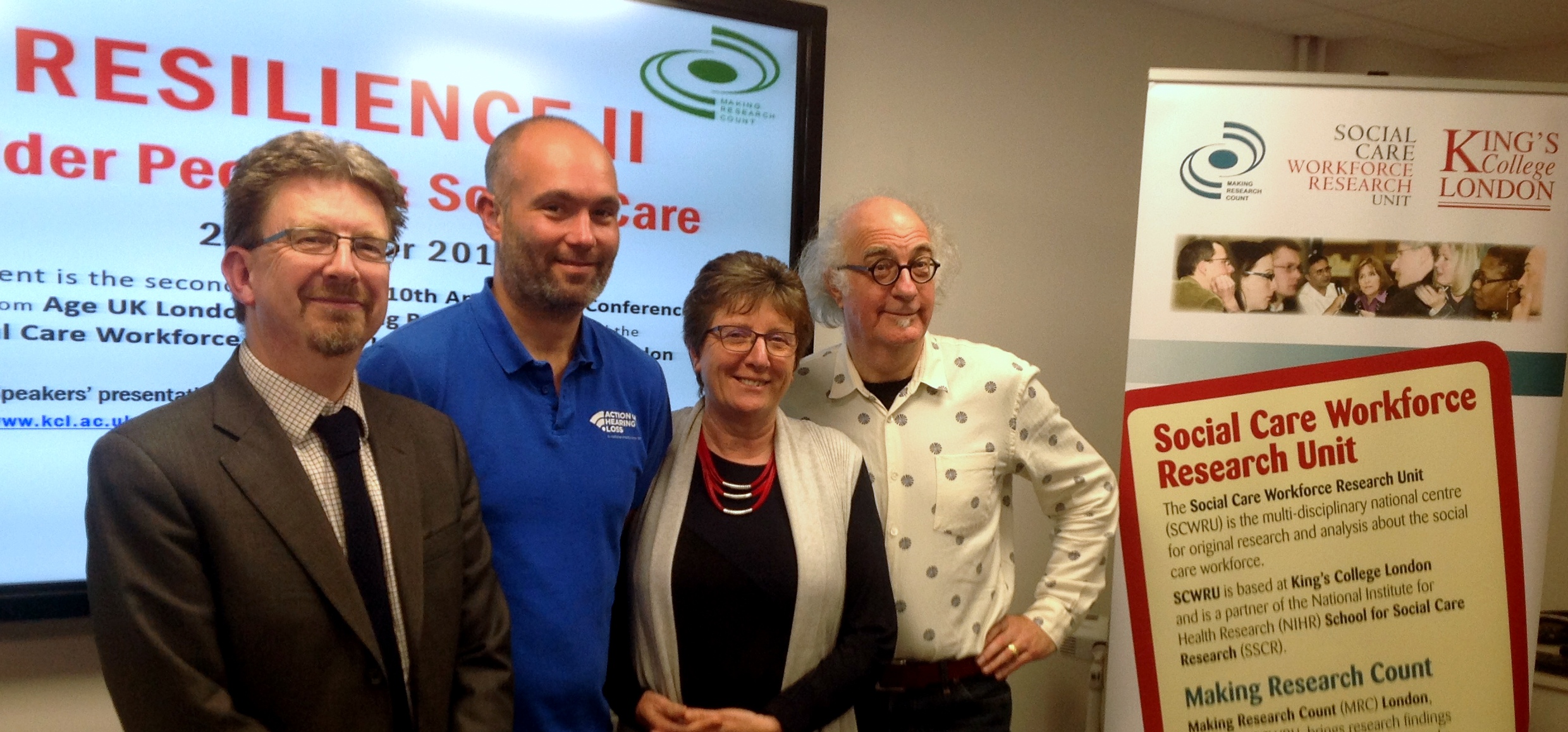
 The 18th International Conference on Integrated Care was hosted by the International Foundation of Integrated Care (IFIC) in partnership with the National Institute of Public Health and the Environment (RIVM and Vilans (the National Centre of Expertise for Long-term Care in the Netherlands) in Utrecht from 23-25 May 2018. Michelle Cornes and I were both fortunate to be among the 800 or so delegates attending the conference.
The 18th International Conference on Integrated Care was hosted by the International Foundation of Integrated Care (IFIC) in partnership with the National Institute of Public Health and the Environment (RIVM and Vilans (the National Centre of Expertise for Long-term Care in the Netherlands) in Utrecht from 23-25 May 2018. Michelle Cornes and I were both fortunate to be among the 800 or so delegates attending the conference. Jo Moriarty
Jo Moriarty
